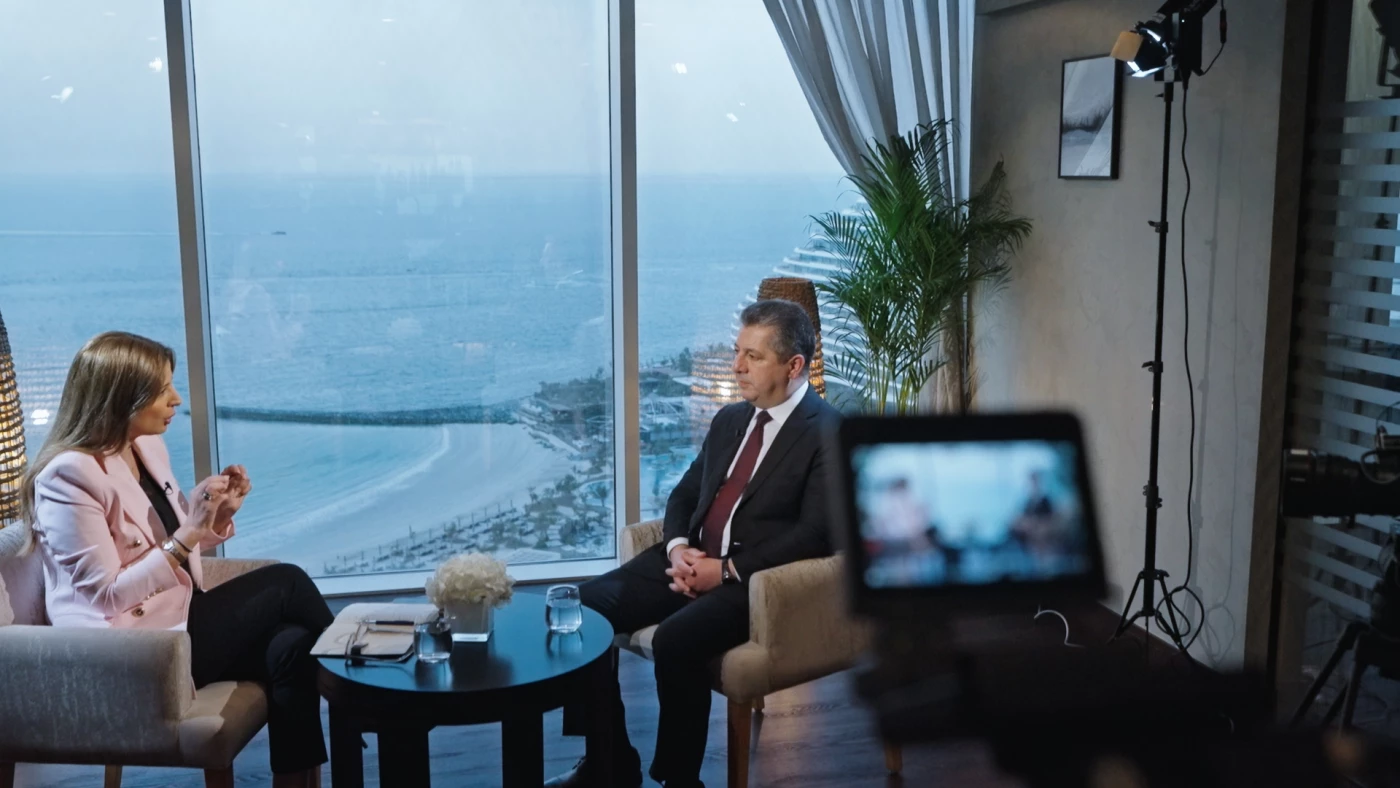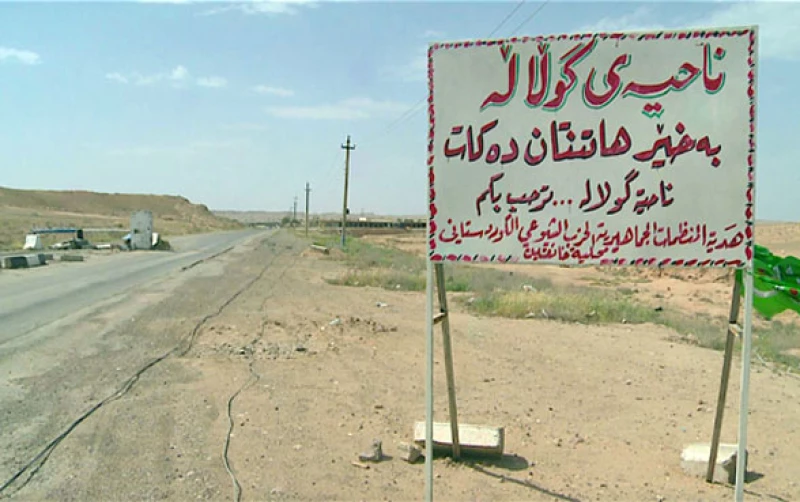ERBIL, Kurdistan Region of Iraq - Kurdistan Region Prime Minister Masrour Barzani denied the presence of Israeli bases in Erbil, describing such rumors as “baseless accusations” used to justify attacks on the Region, during an interview televised on Friday where he also discussed several other topics and pressing issues.
In an interview with Saudi state-owned Al Arabiya, the Kurdish premier touched upon Erbil’s strong relations with the United States, ending the US-led coalition’s mission, ties with Tehran, as well as the situation of Kurds in Syria and concerns over the developments in the neighboring country.
Relations with the US and the coalition’s mission in Iraq and the Kurdistan Region
Prime Minister Barzani stated that the Kurdistan Region enjoys “good relations” with the United States, expressing his appreciation for Washington’s continued support for both Erbil and Baghdad, especially in the fight against the Islamic State (ISIS).
He noted that the Kurdistan Regional Government (KRG) has “friends” within the new Donald Trump administration, and hopes to maintain and further strengthen its relations with the US.
“So far we haven’t been able to have a direct contact with President Trump, but we have good relations with many of those who have been named in his administration, some of whom have been our friends for a long time and have a good understanding of the regional situation, so we maintain contact between us and with the current American administration.”
In regard to ending the mission of the US-led global coalition against ISIS in Iraq, the Kurdish premier stressed that Erbil’s stance differs from that of Baghdad, as it believes the militant group remains a security threat to the country and the rest of the region.
“For us in Kurdistan our position is the same and it has not changed. We remain committed to combating terrorism and staying as part of the coalition fighting terrorism. If the US has the desire to continue fighting terrorism and staying in the region, our position remains the same and we will be ready to maintain our alliance and tackle all the challenges together.”
The Kurdish prime minister said that he believes developments over the past few months, which he described as a “major concern” to the region, have in some ways led Baghdad to reconsider its position on ending the coalition's mandate in Iraq, adding that there might be new agreements on an updated timeline after reevaluating the situation
Iraq and the US in September 2024 announced they had reached an agreement to wrap up the coalition’s military presence in the country by “no later than the end of September 2025” and transition to bilateral security partnerships “in a manner that supports Iraqi forces and maintains pressure on ISIS.”
However, it was stated that the coalition would remain in the Kurdistan Region until 2026.
The US has approximately 2,400 military personnel deployed in Iraq. US forces were deployed to Iraq at the request of the Iraqi government in 2014 to fight ISIS, which had then overrun large swathes of Iraqi territory in the north and west of the country.
Mending relations with Iran
In addition to its strong ties with the US, the Kurdistan Region also enjoys good relations with Iran, said Prime Minister Barzani, adding that Erbil's ties with either country does not need to come at the expense of losing the other.
“Our relations with either the US or Iran is not at the price of sacrificing our relations with the other country. We have respect for both countries and our relations are built on mutual respect. They respect us and we respect them.”
“We are masters of our own fate.”
He acknowledged that relations with Tehran suffered a setback in recent years due to Iran’s continued attacks on the Kurdistan Region, but stressed that those “misunderstandings” have now been resolved.
“There have been times when there have been turbulences in these relations [with Iran], and what is unfortunate is, due to misunderstandings, they have adopted a certain approach, and we saw what happened at the past, but we have passed this phase.”
Since 2022, Iran has carried out multiple attacks on the Kurdistan Region using ballistic missiles, under the pretext of targeting bases of Israeli intelligence (Mossad). Erbil has repeatedly denied Tehran’s accusations.
“This is a baseless accusation,” said Prime Minister Barzani, adding that those who make such claims are only using them as an excuse to justify their attacks.
The status of Kurds in Syria
“We are concerned about what is going on in Syria,” said Prime Minister Barzani regarding the recent developments in the neighboring country, elaborating that Iraq and the Kurdistan Region would be directly affected in case of any escalation which is why we Erbil is working on easing tensions, especially between Turkey and Syrian Kurds.
The Kurdish premier visited Turkey’s capital Ankara last month and met with Turkish President Recep Tayyip Erdogan. Ankara’s concerns regarding Kurdish armed forces in Syria was one of the main topics of discussion.
“We held very sincere discussions, and they were understanding of the situation,” said Prime Minister Barzani on his visit, adding that they understand Turkey’s concerns and that both sides agreed to give the issue more time.
The collapse of Bashar al-Assad in Syria and Turkey’s ongoing military campaigns along with their allied opposition rebel groups on the Kurdish enclave in Syria has once again brought up the issue of Kurdish disunity, a serious development emboldening Syrian Kurds to merge their enclaves and reach an agreement to engage in talks with the international players and new authorities in Damascus.
The Kurdistan Region, notably President Masoud Barzani, plays a mediatory role between the US-backed, Kurdish-led Syrian Democratic Forces (SDF) and the opposition Kurdish National Council (ENKS) to help establish a united front for talks with the new administration in Damascus to safeguard the Kurdish nation’s rights in the country.
Prime Minister Barzani said the SDF is not the only representative of Kurds in Syria, adding that Erbil is trying to bring together all the different Kurdish parties in Syria to make them set aside their differences so that they can participate in the new political process in the country.
“This does not only concern the SDF… I hope the SDF is willing to work with the other Kurds, so that they have a larger representation and have a more inclusive vision of what the Kurds want in Syria.”
He added that the Kurdistan Region will not force Kurds in Syria into a certain direction, stressing that it is for them to decide what is the most appropriate solution for their issues with the new Damascus administration.
Turkey considers the People’s Protection Units (YPG), the backbone of the SDF, to be inextricably linked to its domestic foe, the PKK. However, the YPG insists that they merely subscribe to a similar ideology.
The SDF, considered the Kurdish de facto army in Syria and the US’ primary ally in the fight against ISIS in the country, controls the bulk of northeastern and eastern regions of Syria, amounting to a quarter of the country's territory.
Prime Minister Barzani last month met Syria’s Interim Foreign Minister Asaad al-Shaibani in Davos, discussing “the general situation in Syria, developing bilateral ties, and the regional developments” and Kurdish rights in the country, on the sidelines of the World Economic Forum.
During the meeting, Syrian Foreign Minister Shaibani invited Prime Minister Barzani to visit Damascus.
Editor's note: Barzani's remarks were originally in English, but the televised interview was dubbed into Arabic. This article is a translation of the Arabic dubbing.



 Facebook
Facebook
 LinkedIn
LinkedIn
 Telegram
Telegram
 X
X


